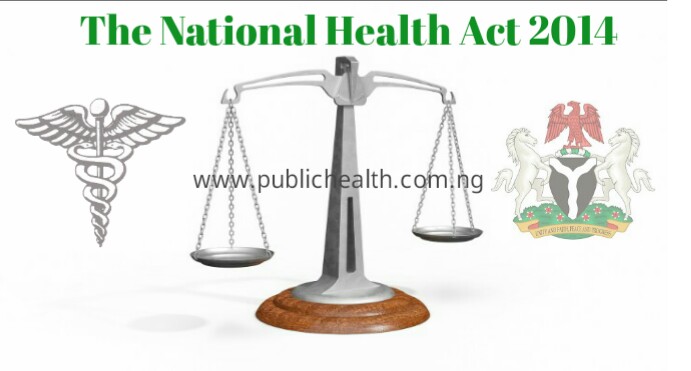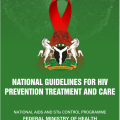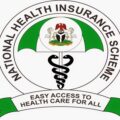Nigeria’s National Health Act 2014 was signed into law by President Goodluck Ebele Jonathan on the 9th of December, 2014. The Act established the framework for the Regulation, Management, and Development of a National Health System and also set standards for rendering health services and other related matters.
One of the major objectives of the Act is the elimination of quacks and the promotion of professionalism in the health sector. The Act also seeks to help Nigeria reduce maternal and infant mortality rates amongst several other laudable objectives including the achievement of key Millennium Development Goals. (See Download links Below)
National Health Act 2014CLICK HERE TO DOWNLOAD THE OFFICIAL COPY OF THE NATIONAL HEALTH ACT 2014 (pdf)
CLICK HERE TO DOWNLOAD THE NATIONAL HEALTH ACT EXPLANATORY MEMORANDA (pdf)
Click on The Link Below to Download The Full List of Notifiable Diseases and The Standard Case Definition of Priority Diseases and Conditions In Nigeria The Standard Case Definition of Priority Diseases and Conditions In Nigeria
THE NATIONAL HEALTH ACT 2014 AND ITS IMPLICATIONS FOR THE NIGERIAN HEALTH WORKER: A KEYNOTE ADDRESS PRESENTED BY THE PRESIDENT OF NIGERIAN MEDICAL ASSOCIATION (NMA) SIR DR LAWRENCE KAYODE OBEMBE ON THE OCCASION OF A PUBLIC AWARENESS CONFERENCE ON THE NATIONAL HEALTH ACT BY THE ACE MEDICARE CLINICS LIMITED ON TUESDAY 15TH DECEMBER 2015.
Protocols:
It is no longer news that the NATIONAL HEALTH ACT which had a long gestation period of ten solid years from 2004 -2014 has eventually been delivered and its implementation began in the eyes of the law. What is news is that for the first time since the existence of our nation, there is no legal backing for the regulation, development, and management of our health system and setting of standards for delivering health care to our citizens. Prior to October 31, 2014, when Pres. Good luck Ebele Jonathan GCFR signed the bill into law, healthcare delivery was just a matter of prediction of the body language of the various political leaders; nothing compelling anyone to do anything. Going down memory lane, the 1959 Constitution placed health on the Concurrent Legislative List as a responsibility of both the Federal and Regional Governments without clear cut lines of responsibility or collaboration. In the 1979 Constitution, health was on the Concurrent Legislative List as responsibilities of the Federal and State Governments; the same lacunae persisted. In the 1999 Constitution and even with the amendment, health was neither included under the Exclusive nor the Concurrent Legislative List- perhaps not considered important as at that time left to God as most Nigerians resort to when helpless. Although Health is merely mentioned in the 1999 Constitution in chapter II, Section 17 deals with the Fundamental Objectives and Directive Principles of the State (Government shall serve to provide security and welfare of citizens of which health is one but not expressly mentioned), that, gave health a status of a right but one that is not justiciable or enforceable by law. There is also a mention of health in the Fourth schedule in connection with the functions of a Local Government Council which states – ‘Local Governments shall participate in the provision and maintenance of health services; This does not make LG responsible for PHC as erroneously perceived by several people. Also out of the 68 items in the Constitution’s Exclusive Legislative list, there was no guarantee of healthcare, except for a mention of Drugs and Poisons as item 21 and in the Concurrent list where health was only mentioned in relation to industrial safety out of the 30 items. In the absence of a Constitutional or any other legal outlining and assignment of responsibilities for healthcare, the “1988 National Health Policy, and Strategy to Achieve Health for All Nigerians” assigned primary healthcare to local governments; secondary healthcare to state governments; and tertiary healthcare to the federal government. This stop gap measure wasn’t backed by any form of legislation and lacked the power of enforcement, hence health care delivery continued to suffer as no level of authority or governance could be held liable by any law except good conscience which obviously appeared to be in a comatose state among many leaders in Nigeria.
The practical meaning of the absence of an unambiguous legal provision for healthcare delivery in Nigeria characterized the Nigerian healthcare delivery sector with the following features:
There is no clear definition of roles and responsibilities in health for the different tiers of government. All the tiers are involved in various aspects of healthcare delivery; doing similar things very poorly- inefficiently and ineffectively. The result is the perennial abysmal indices that our country has become known for. The health sector was hitherto thrown into chaos as adequate coordination and collaboration on health matters by different tiers of government became a very scarce commodity. The worst implication of the pre-NHAct 2014 situation is the chronic underfunding of the health sector. That despite being a signatory to various treaties and agreements even the one signed by African heads of government in Abuja in 2001, public healthcare expenditure as a percentage of the GDP continued to be laughable for a country that was in the pit of gravely poor health indices was worrisome. The unregulated scenario was fraught with a lack of accountability with regard to the provision and financing of health services- many cared less, the people suffered various diseases and died, yet no one was held responsible for this brazen act of misgovernance. The other ills of the dark days include the absence of effective linkages and referrals within the health system; lack of standards or regulations for health related research; inter-sectoral collaboration and enforcement of rights of the patients including confidentiality of their information; and those of the practitioners and even strike actions by health workers. Industrial disputes occasioned mainly by inter-professional rivalry and the inability of the various governments to keep to agreements of collective bargaining offered more confounding fumes that fanned the embers of a collapsing system.
SEE: Equity Vs Equality: Understanding The Difference
In providing the framework for setting and maintaining standards for the development, regulation, and management of the national health system and setting standards for healthcare delivery in Nigeria, the NHAct 2014 bridges the legal lacunae through the following mechanisms and processes; Establishment of the hitherto non-existent National Health System(this means the structure and function of the Nigerian national health system as a national identity peculiar to us which is tailored towards solving our own needs with homegrown initiatives. As part of the above, the National Council on Health (NCH) the highest policy making organ for health in Nigeria with the composition, functions, and modus operandi for the first time has been established by law through this act. The Act has also made provision for the eradication of mushroom facilities at all levels of care with the provision of the Health Institutions Standards Committee whose duty would be to set standards in terms of location, equipment, staffing, etc. of public and private health institutions- classification of health establishment, technologies and certificate of standards, including offenses and penalties in respect of Certificate of Standards.
Perhaps, the loftiest provision of this act is the establishment of the Basic HealthCare Provision Fund (BHPF) which would be financed from the first line charge of not less than 1% of the Consolidated Revenue Fund of the federation and other sources- the surest guarantee come rain, come shine. This prescribes a basic healthcare package every Nigerian would be entitled to. This fund would be disbursed through the National/state/LGA’s Primary Healthcare development agencies, the National Health Insurance Scheme, provision of essential drugs, maintenance of healthcare infrastructure, and development of human resources for health and subsidies for emergency medical treatments which have caused many Nigerian private healthcare practitioners sleepless nights. There are several other lofty provisions in this mother law of health in Nigeria- best described as the best thing that has happened to health care delivery in Nigeria.
What are the direct responsibilities of doctors and other health workers in connection with the National Health Act 2014? In as much as the law has provided most if not all that had been lacking to move our health sector forward, let me warn that there is a huge burden on the part of practitioners as there are no clear cut sanctions for wrongdoing and provisions to keep us on our toes 24/7.
The Act provides for a free Basic Healthcare package for all Nigerians and even age-based exemption from payment for healthcare services. For most Nigerians, this is fait accompli. However, it still exists on paper. The year 2015 has run out without any mention of the provision of that Basic Health Care Fund (BHCF) in the main appropriation or the supplementary budgets. 2016 is around the corner and to the best of my knowledge; it is still unclear if this BHCF would be captured even as our national revenue is plunging deeper and deeper into the red. Most, unfortunately, the only ones Nigerians can see and complain to, is the health worker. They do not have access to their political leaders. Soon patients would be demanding that they be treated free of charge because the law provides emergency medical treatment; what they do not know is that the modality for translating the provisions into reality is still a mirage. It also behooves medics to educate the public about what an emergency medical condition is. This is necessary before ill intended legal fires start appearing from various angles as conviction under Part III Section 1 sub (2) is six months imprisonment or ₦100,000.00 option of fine or both. Therefore, health workers should stand up and make a strong demand to governments to kick start the implementation of the National Health Act with the establishment of the governance structures and other implementation platform sine qua non to the actualization of the lofty provisions of the Act.
Healthcare workers should be aware that under the dispensation of the NHAct 2014, the era of establishing mushroom contraptions and operating them as health facilities is over. Part II section 2 of this law prescribes a punishment of two years imprisonment or an option of N500,000.00 fine if found guilty of operating a health facility, health agency, or health technology without a Certificate of Standards 24 months from October 31st, 2014 when the Act started being effective. Related to this is the cautious warning given to private healthcare providers in Part IV section 7. The message is that it is no longer business as usual as it relates to standards of practice, health information management, and compliance with other provisions of the act. A six (6) months imprisonment or ₦100,000.00 option of fine or both, awaits defaulters. Perhaps, the best implementation strategy as well captured in this law is the prescription in Part V section 6 which regulates overseas medical treatment. Should government officials who are entrusted with the provision of efficient healthcare delivery to the people be made to eat from the same pot of food they are serving the populace, it is reasonable to posit that health institutions would once more be restored back to the former glory exemplified by the state of UCH in the 60s.
The NHAct provides that timely referral of patients to where they can access better care is now mandatory under Part II section (7) of the Act. This for the first time removes the liability from that of good conscience to an issue of law. There is, therefore, a need to provide an effective framework to translate the provision into an actionable program where referral, as well as feedback to the referring hospital, would be better coordinated to impact patients’ survival outcomes and improve healthcare information for good of all.
On the other hand, one of the issues begrudging effective coordination, especially in delivering medical services is the cold relationship between the private and public sector healthcare workers. Collaboration between public and private health institutions is now legalized as provided for in Part II section (8) and no longer predictions of the body language of who calls the shots in the administrative apparatus of health. In fact, this opens greater room for the much touted public private partnership (PPP) options in the health sector. Does it make sense that an institution is a jack of all trades but a master of none? This provision would indeed open up greater opportunities for our colleagues in the Diaspora to come and contribute their quota to health care delivery in our nation under a guaranteed enduring investment climate.
Furthermore, our clients who are eventually mistreated now have an easier modality of redressing service failure. It reduces the burden of going through say the MDCN through the rigorous path of sworn affidavit. This Act provides for simpler complaints laying procedure that would redress criminal negligence, infamous conduct as well as a vicarious liability (Part III Section 10). Therefore, the proponents of the Medical Negligence Bill proposed in the 7th House of Representatives can now go to sleep as a more decent way of ensuring that the misdeeds of health workers are redressed is available.
The National Health Act 2014 is not only about the prescription of sanctions for wrongdoing. It promotes availability, effectiveness, efficiency, and coordination in the public health sector and the protection of the wellbeing of the practitioner. In part II section 11, the healthcare provider for the first time aside from fundamental human rights guaranteed under the 1999 constitution as amended, now has a protected right to exist and be treated fairly. The training, development, and welfare of health workers are not also neglected in this law as part III section 11 subsection 1-3 assures that the health worker is not abused, assaulted, or subjected to other forms of mistreatment. This is a welcome development as a core pillar of Clinical Governance that protects patients and caregivers in tandem.
One of the ills of our health sector is the skewed distribution of human resources for health in favour of the urban areas rather than rural where the burden of disease is highest. Addressing this challenge, part V of this Act makes ample provisions for the availability, development, management, and utilization of well-trained human resources at all levels within the national health system and even empowers the Honorable Minister of Health to create new categories or cadres of health care personnel in conjunction with the appropriate authority (subsection 3c) according to the need of the sector. Therefore, the era of splinter groups to go through the back door to carve out professional cadres from a mere technical level and fuel industrial disharmony is over. This function has now been assigned to the Minister of Health though without prejudice to laws that may be enacted by various state’s houses of Assemblies.
Recognizing one of the worst nightmares clogging the wheel of progress of healthcare delivery in Nigeria, the mother law of health administration in Nigeria the NHAct 2014 was bold in assigning the minister of health the responsibility to resolve industrial disputes in the health sector within fourteen (14) days. Part V section 5 of this law puts the government bureaucracy headed by the Minister on his toes to ensure industrial harmony especially as it concerns respect for and implementation of agreements within a reasonable period.
Perhaps the thorniest issue which bedeviled the earlier passage and assent of this Act is the poor understanding of Part VI which deals with the control of blood, blood products, tissue, and gametes in humans. Whereas this area is purely prohibitive of experiments with human gametes or zygotes and provides serious regulatory mechanisms and processes against frivolous human organ donation, certain faith based organizations and their allies allege unfounded insinuations against the true spirit and letter of this law. I, therefore, refer all to carefully peruse Part VI of this Act and judge for yourselves if imposing unambiguous restrictions against toying with human lives right from conception or racketeering trade with human organs is not necessary. The NHAct does not permit abortions nor does it encourage reproductive or therapeutic cloning of humankind for any reason whatsoever.
The Act ends with Part VII which defines several terminologies and provides explanatory notes on several provisions to promote a clear understanding of this piece of legislation.
Dear Colleagues, Ladies, and Gentlemen, I would end this keynote address by reminding us that it would be better for Healthcare personnel to spearhead the implementation of this law. If we take the lead, we would be able to offer explanations and clearly provide definitions to ambiguous technical terminologies, if any, which only the medical world could get to their deepest root meanings. The time to educate fellow citizens about the workings of health institutions, what to do when ill; how to access care, and how to redress mistreatments and service failures amongst other rights and privileges guaranteed in this piece of legislation is now. The earlier we start the better for all of us. If we hesitate further, Lawyers would start making minced meat of our profession and feed fat from our ignorance or indecision. The medical community should and must take the lead in mobilizing our nation toward the actual implementation of this Act. This starts with understanding what the provisions of the law are. Infact, if possible, I would encourage every healthcare worker to memorise essential sections of this Act. It is on this note that I salute the efforts of Ace Medicare Clinics ltd the organizers of this very important educational programme. Knowledge is power. Thank you very much.
SEE: Public Health Surveillance: Steps, Types, Importance
As we say goodbye to the era of poor access to health care, stock-out syndrome of essential drugs and vaccines, skewed health manpower distribution, mushroom health facilities, hospitals turned to “mere consulting clinics” unregulated and unethical health research, assault on health workers, total paralyzing strikes that leave the nation no option than unnecessary death of the citizens, etc. let us ponder and appreciate the efforts of several compatriots who worked in the open and in the secret towards the actualization of this legislation. We would not forget that it is the Change Agent Program spearheaded by the erudite WHO-classed Health Economics Prof. Eyitayo Lambo who used the evidence that health systems governed by an over-arching law perform better, that began this revolution. We would not forget the committed efforts of Sen. Dr. Martins Yellowe and Sen. Dr. Gyang Dalyop Dantong now both of the blessed memory that was there at the National Assembly in the 5th, 6th, and 7th Assemblies accordingly. We appreciate the dexterity of Sen. Dr. Iyabo Obasanjo Bello, HE Sen. Dr. Ifeanyi Okowa, Hon. Ndudi Elumelu and their various committee members; the Health Sector Reform Coalition with membership drawn from professional Associations in the Health sector, CSOs, NGOs, and the federal ministry of Health for a job well done.
It would be recalled that the three succeeding NOCs of NMA neither slept nor slumbered because of the actualization of the National Health Act. I remember that NMA took the decision to champion the actualization of this law at the National Health Summit convened by the Nigerian Medical Association proudly sponsored and hosted by one of our members HE Dr. Emmanuel Uduaghan the immediate past executive governor of Delta state in January 2013. He also sponsored the historic and legendary match on Abuja streets for this purpose on the occasion of the Senate public hearing for the Bill in March 2013 which NMA members attended from the 36 states of the federation and the FCT. The state chapters made it points-of-duty to raise the issue of the passage of the Bill into law at every forum including sponsored press conferences. I salute them all. Providence once more decided to honour me as the president of NMA in whose hands the National Health Act would be delivered. I am immensely honoured. As the nation looks forward to the speedier implementation of this law, join me to share the cautious optimism that Nigeria’s health system is perhaps on its path to recovery if the lofty provisions are implemented.
Thank you all for listening.
Sir, Dr. Kayode OBEMBE
President
Nigerian Medical Association
Main Provisions Of the Nigerian Quarantine Act Of 1926
Public Health Nigeria an Interdisciplinary public health movement focused on health education, advancing fair public health policies, promoting fitness, healthy diets, responsible behavior, community health and general well-being.





